In most games, roadside villages are respites — hard-earned rests for weary travellers. In Pendragon, a narrative-driven turn-based strategy game about the fall of Camelot that just came out on PC, they are a wakeup call.
Unlike many other turn-based strategy games, Pendragon plays out like a roguelike; you make multiple runs through a series of randomised locations in hopes of seeing the conclusion of its dramatic arc, which — based on the various characters in your party — contains a multitude of additional, multifaceted dramatic arcs that make the game “infinitely” replayable, according to 80 Days and Heaven’s Vault developer Inkle. (The jury is still out on that last part, but after four hours, I’ve found the game to be Pretty Darn Replayable, at least.) Your goal, as one of many selectable main characters from Arthurian legend, is to rush across Britain to reach King Arthur’s side in time for his climactic battle against Mordred, his spiteful son.
During an early run, I, playing as Queen Guinevere, stopped in a decrepit roadside town. The denizens of this place were not awed by living legends; rather, they resented Guinevere and her companions, who they said had lived behind golden walls and paid no heed to the needs of common folk. Mordred, they claimed, was different. He was like them.
I did not want to harm the villagers, but, turn by turn, they advanced with knives aloft. Each time I used a turn to give ground, Guinevere and my other characters pleaded, saying that all had been welcome in Arthur’s halls, that we were all the same — all just travellers. On several occasions, I thought for sure that the scene would explode into violence, the sort that would be the scripted end to such a confrontation in many other games. But I continued to manoeuvre evasively, even as my characters’ morale metre drained. Eventually, the villagers lost their nerve. They lowered their weapons and told us to just leave. It was clear that they’d realised they would not find the satisfaction they sought in an ugly, drawn-out gutter battle with my band of disgraced heroes. My characters could not comprehend the suffering these villagers had endured, and no amount of explanation, or violence, was going to get the point across.
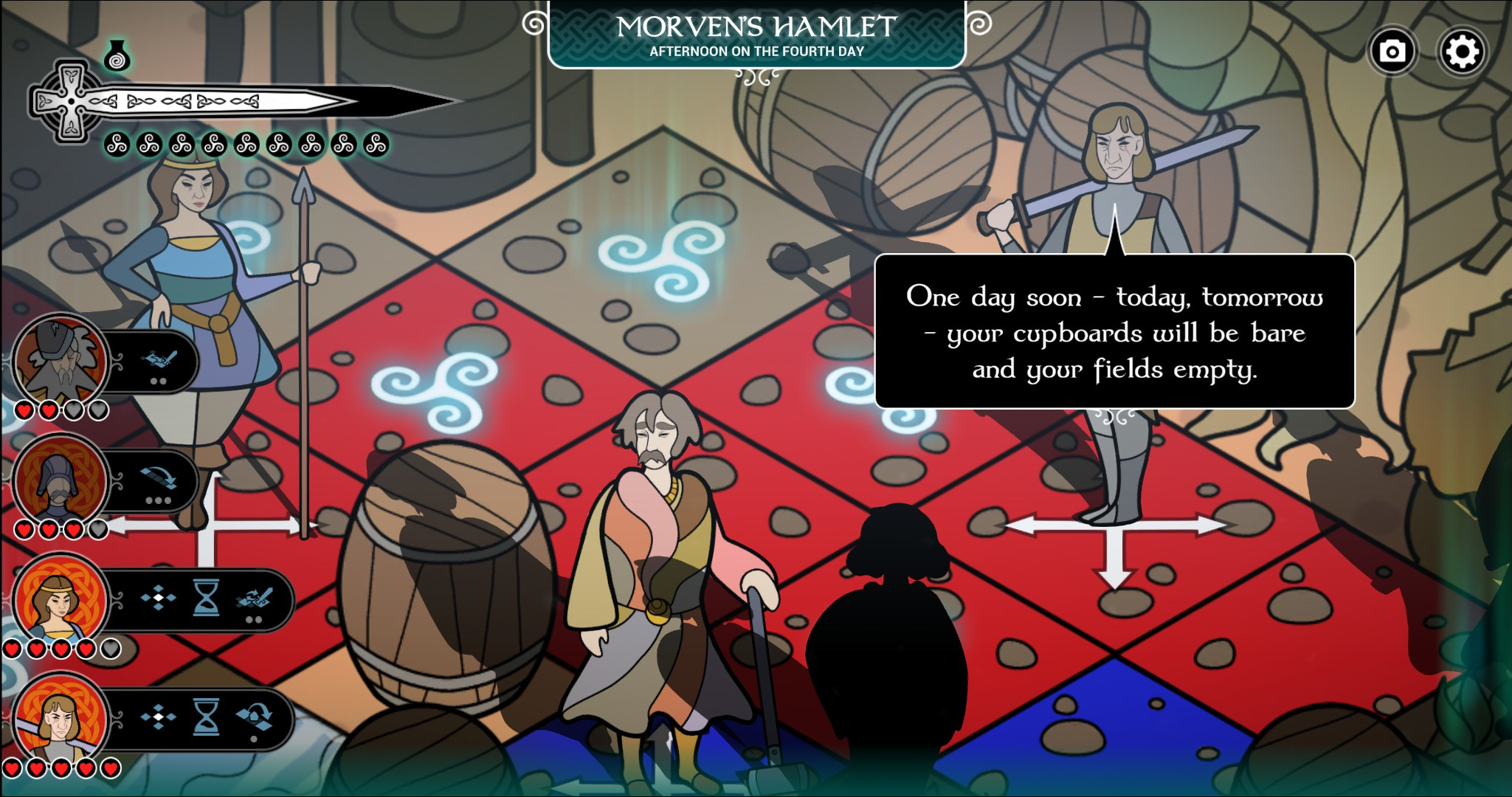
Every major scene in Pendragon, whether it ends up involving actual combat or not, takes place on a checkered board where claiming territory is key, and if a character takes a single hit, they go down — sometimes permanently. Throughout the entire “battle” against the villagers, not a single drop of blood was spilled. And yet, it was tense and draining. Quietly devastating, in the end.
I have encountered similar scenarios in subsequent Pendragon runs. Sometimes villagers get scared and flee. Other times, they push and push and push until my characters lose their nerve and flee. Once, I got fed up and had Sir Lancelot, former Knight of The Roundtable and hollowed-out shell of a man, haul off and hack one in half. The others immediately cowered and begged us to leave. I felt bad, but also like it was in character for this version of Lancelot, sick with guilt for betraying his liege by sleeping with Queen Guinevere and abandoning the roundtable — information he’d conveyed during a different, earlier run. What are a few splatters of innocent blood when you’ve already committed what are, to you, the gravest sins imaginable? That, though, just made it even worse: These villagers accused Guinevere, Lancelot, and the rest of being too preoccupied with their own little world to grasp the gravity of regular people’s struggles, and here Lancelot had just done a grisly murder in broad daylight because he had someplace to be.
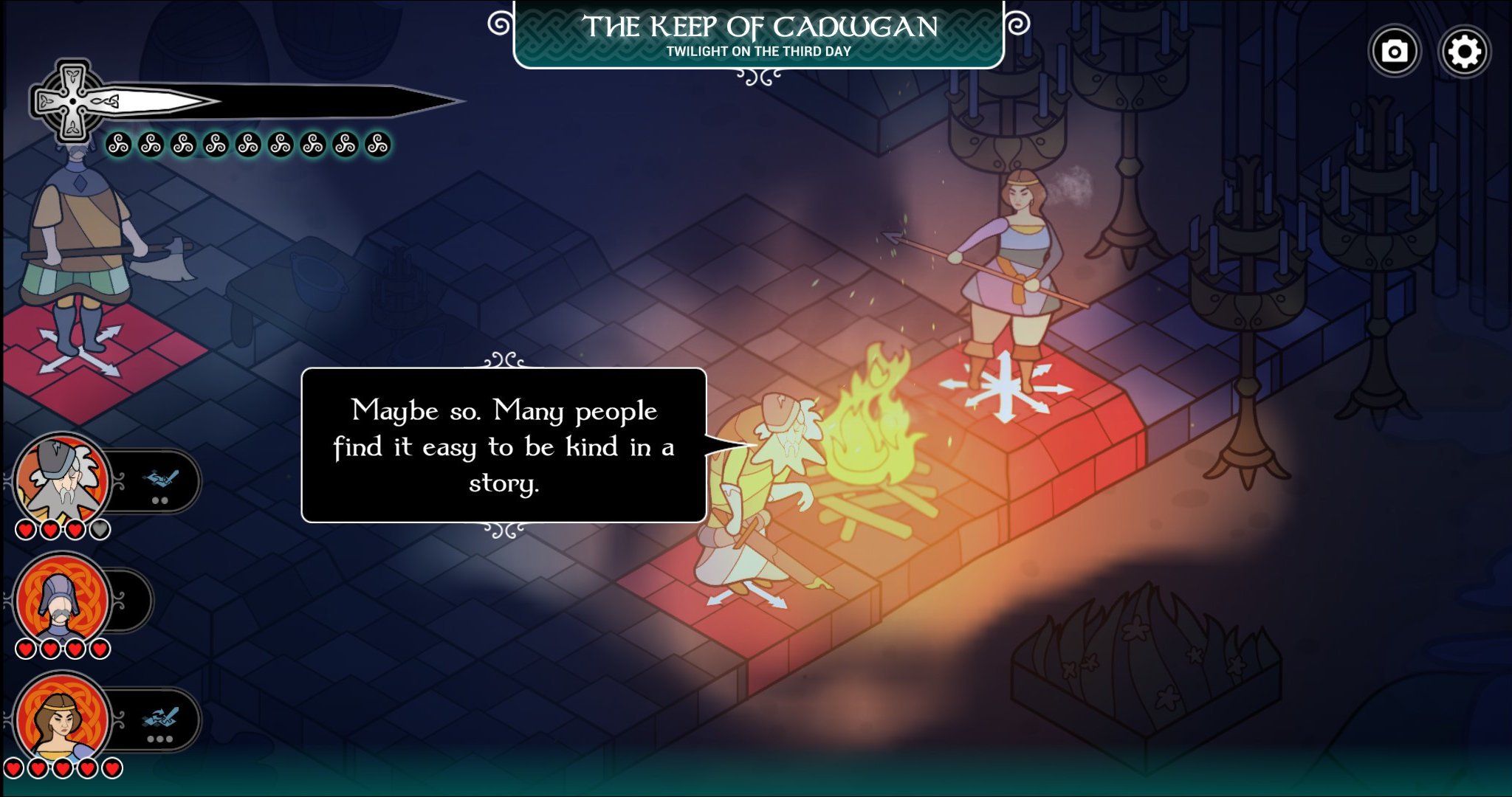
Pendragon is packed full of excellent player-directed vignettes like this. The game’s dialogue system is vast and context-driven, based on an impressive variety of factors: which randomised location you’re at, who you’re with, who you’re fighting, where you are on the board, whether you’re advancing aggressively or playing defensively, what stance you’re in, and so on. As a result, encounters are rife with character-driven drama. Each turn advances a character’s story. Big moments — like defeating an enemy or saving an ally’s life — are sometimes followed by a change in a character’s overarching motivation, which comes with a new special ability. For example, one of my characters, Sir Wade, gained the ability to attack diagonally when he became the last remaining member of my party on the battlefield. This was tremendously useful and allowed him to win the day and save everybody else. Then, as a result of that momentous occasion, he gained another new motivation and a different ability.
These new abilities replace old ones tied to previous motivations, and though most abilities are powerful, I’ve sometimes found myself wishing that I could, for example, attack diagonally during the final battle. It’s cool that Pendragon forces you to vary up your play style, but a couple of my best runs have fallen short for reasons that did not stem directly from my own tactical decision-making. That’s par for the course in roguelikes, but in Pendragon, it can feel a little too random, a little too disconnected from how I’m conducting myself in battle, even if these abilities do technically arise from my choices on the battlefield.
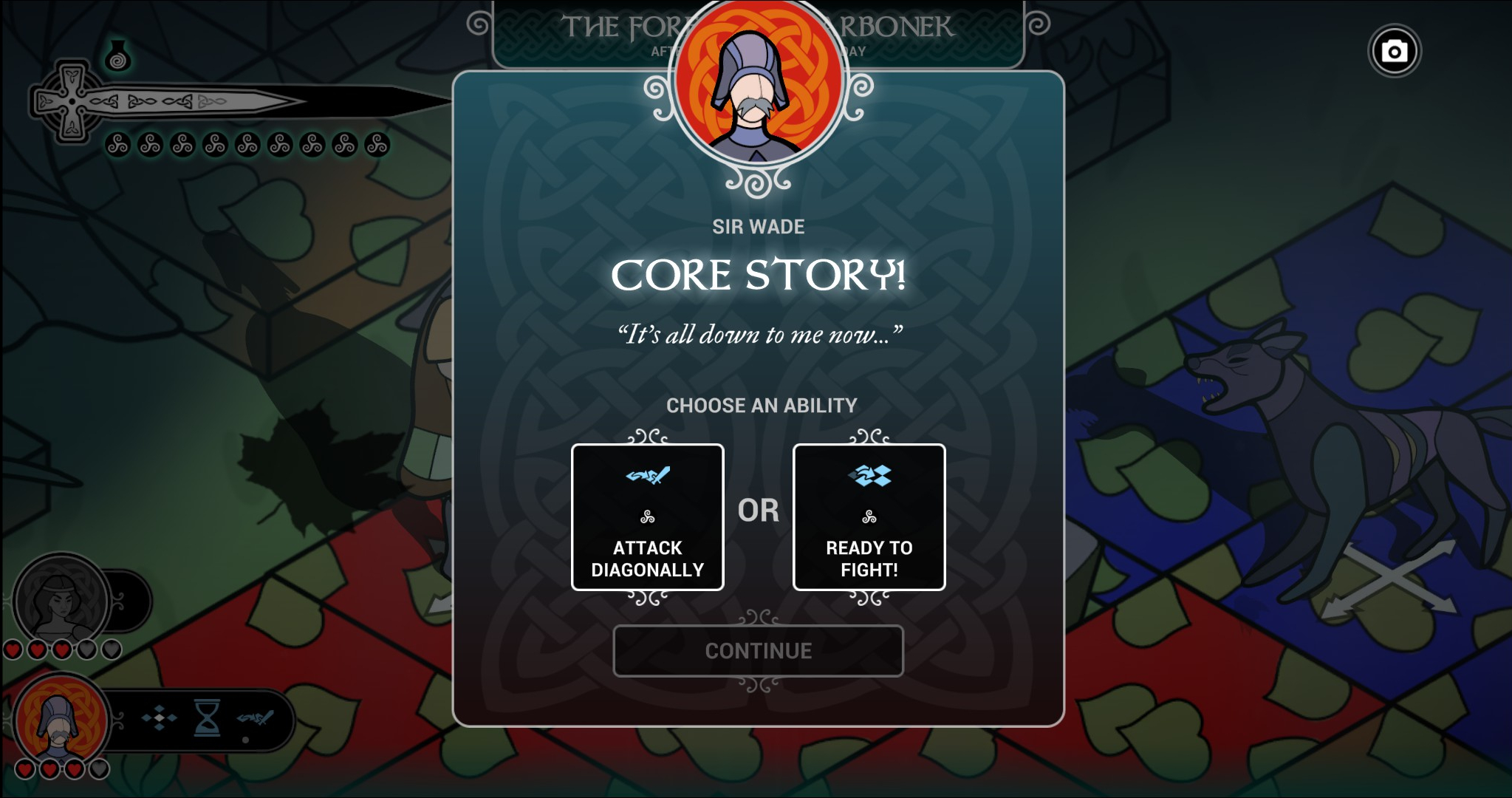
This is one reason that Pendragon is heavy on trial and error, which seems intentional, given the game’s roguelike influences. Its approach to explaining itself strikes me as a little more questionable. On their face, battles seem very simple: Each side can move one character per turn, and if you manoeuvre a character onto an enemy’s space, you kill them. But there are a multitude of systems underlying this almost board game-like approach to turn-based insult sword fighting. There are multiple stances, some of which allow characters to move diagonally (but not attack) while others focus on linear movement (with attacks). Some abilities allow you to break out of these rigid boxes, while others do not. Some raised spaces change the rules, allowing you to move linearly or diagonally regardless of stance. Then there’s a whole territory system wherein you capture individual squares by moving (more while in diagonal stance for some reason), which grants you more movement space so that you can set up attacks from a distance, rather than slowly wading into the boot-sucking muck of danger. Oh, and claiming territory is also tied into a mid-battle currency that you spend on everything from using abilities to calling other characters onto the battlefield.
Pendragon gestures in the general direction of explaining some of this, but not in a way that feels holistic or otherwise immediately legible. It took me four runs — or around two and a half hours — before I actually felt like I knew what I was doing in the final battle on the game’s starter difficulty mode.
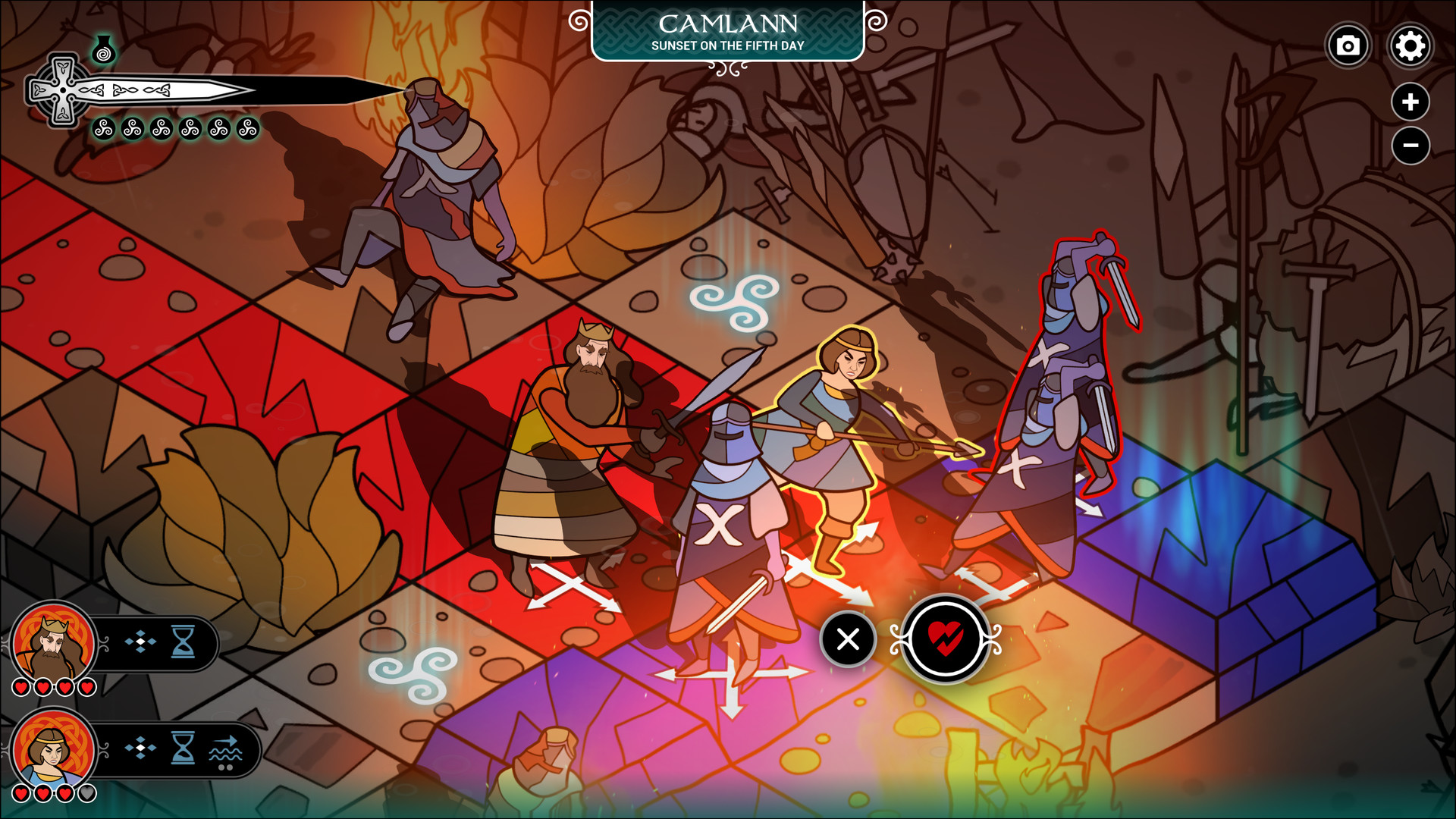
That’s not to say I minded it all that much, necessarily. In Pendragon, failures have led to some of my most interesting stories. In my Queen Guinevere run that included The Villager Incident, Sir Lancelot joined my party after a tense discussion about he and Guinevere’s shared past and the ways in which they’d failed Arthur — and also the fact that, despite everything, Guinevere still loved Arthur. Then they rode to his rescue. In the ensuing battle, I backed myself into a corner and sent Lancelot to what ended up being his (permanent) doom. Before fading away, he confessed that he loved Guinevere. If this rattled Arthur, he did not show it. Instead, he moved to confront Mordred and end things once and for all. However, a dialogue option popped up allowing me to instead confront him as Guinevere. I picked it. It felt right, given what Guinevere had been through. She’d betrayed Arthur’s trust, watched Lancelot — her star-crossed paramour — die trying to defend her, and learned more acutely than ever that Arthur’s reign had left the countryside in ruin. There would be no happy ending to this story.
In that playthrough, Guinevere did not defeat Mordred. After a few clumsy manoeuvres on my part, he struck her down. A brief epilogue appeared on screen.
“Sir Mordred stands victorious on the field of battle,” it read. “Guinevere is curled up on the earth, finally at peace.”
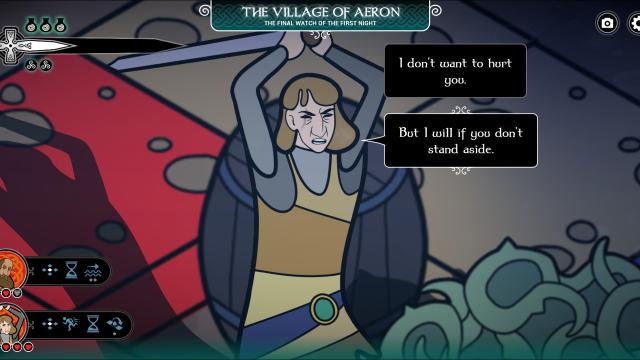
Leave a Reply